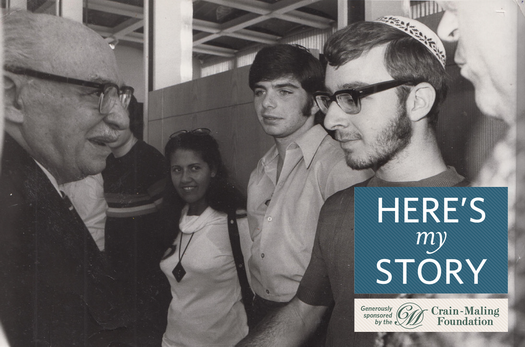
Here’s My Story: Discuss it with Your Ancestors
by Mr. Kasriel Oliver
Click here for a PDF version of this edition of Here’s My Story, or visit the My Encounter Blog.
I grew up in Melbourne, Australia, in a home that was traditional but not observant. However, my parents sent me to a Lubavitch school from the age of eleven where I was greatly inspired by one of my teachers, Reb Shmuel Yelen, and I began to observe more of the mitzvot. By the time I was a teenager, this was causing tension at home as my father and mother were concerned that I would not be able to support myself if I opted to learn in a yeshivah instead of attending university.
I was respectful of them – as is the Torah way – but I also knew my path. So I told them that I planned to defer enrolling in university and would, instead, enroll in the Chabad Yeshivah Gedolah in Melbourne. I did this in 1972 against their wishes. While in yeshivah I won the Australian “Bible Quiz” for which the prize was a trip to Israel to represent Australia in the international Bible Quiz in Jerusalem. At that stage, my parents were proud of me.
After a year in the yeshivah, I entered the University of Melbourne, as my parents wanted me to, while continuing to be involved with Chabad and its outreach activities on campus. I took a break in the Australian summer (which corresponded to the New York winter of 1974-75) and came to Brooklyn, to study for a few months at the Chabad yeshivah there and to meet the Rebbe.
The chasidim did not make such a great impression on me, but the Rebbe was just amazing – he had a regal demeanor yet, at the same time, a great humility emanated from him, and I felt strongly that I was in the presence of a true spiritual leader.
In January of 1975, I merited to have a private audience with the Rebbe. As I was waiting for my appointment, I could feel the emotion building inside me – I was going before a tzaddik to discuss lifelong questions and dilemmas that would affect me and my family, and maybe even future generations. It was definitely a monumental moment for me.
In advance of the meeting, I wrote a long letter explaining my background and listing my questions. One of them concerned my growing a beard, which my parents were totally opposed to. They thought that this was unbecoming and would disadvantage me and make me unemployable. I knew that my parents meant the best for me. And yet, the Torah requires that a man not cut “the corners” of his beard, which is why Jews wear sidelocks, and many don’t cut any part of their beard at all. So I did not know what to do.
The Rebbe’s answer puzzled me somewhat. He said that, since I would be returning to Australia via Israel, I should stop at four holy places and pray about my dilemma. He did not tell me whether or not to grow a beard – he just told me to pray at these four holy places about this matter and then to reach a decision there on my own.
The four places the Rebbe named were: the Western Wall, the retaining wall of the Holy Temple in Jerusalem; the Cave of the Patriarchs in Hebron, where Abraham, Isaac, Jacob and their wives, Sarah, Rebecca and Leah are buried; Rachel’s Tomb near Bethlehem, the final resting place of Jacob’s beloved second wife; and the Tomb of Rabbi Shimon Bar Yochai, the author of the primary text of the Kabbalah, in Meron.
“After praying at these places, you should return to Australia and tell your parents that you made a decision,” the Rebbe said, predicting that, when I did so, they would go along with whatever decision I made.
However, the Rebbe must have been concerned that I would be discouraged by people insulting or putting down my religious way of life because he pointed out that at the very beginning of the first chapter of the first section of the Code of Jewish Law, it states, “do not be embarrassed when people mock you.”
“Do not be discouraged,” the Rebbe said. “And do not be embarrassed because you are loyal to Torah and its mitzvot. You must be strong and not be concerned at all.”
His advice helped me a great deal. I went on to study at the university with a full beard – which my parents accepted, as the Rebbe said they would – and I graduated with a degree in applied chemistry. Later, I became the chief chemist for Kosher Australia, a position which I have held for the past thirty-six years.
My job entails auditing and assessing all aspects of food production and ingredients to determine possible kosher certification. This requires extensive and detailed knowledge of raw materials and the latest food technology. I am not the rabbi who gives the kashrut certificate, but I am the chemist who provides the technical details of the ingredients and the manufacturing process.
It is an important job, and I think I have made my parents proud, and I hope the Rebbe as well.
Mr. Kasriel Oliver has served as the chief chemist for Kosher Australia for over thirty-six years. He was interviewed in Melbourne in July of 2016.














